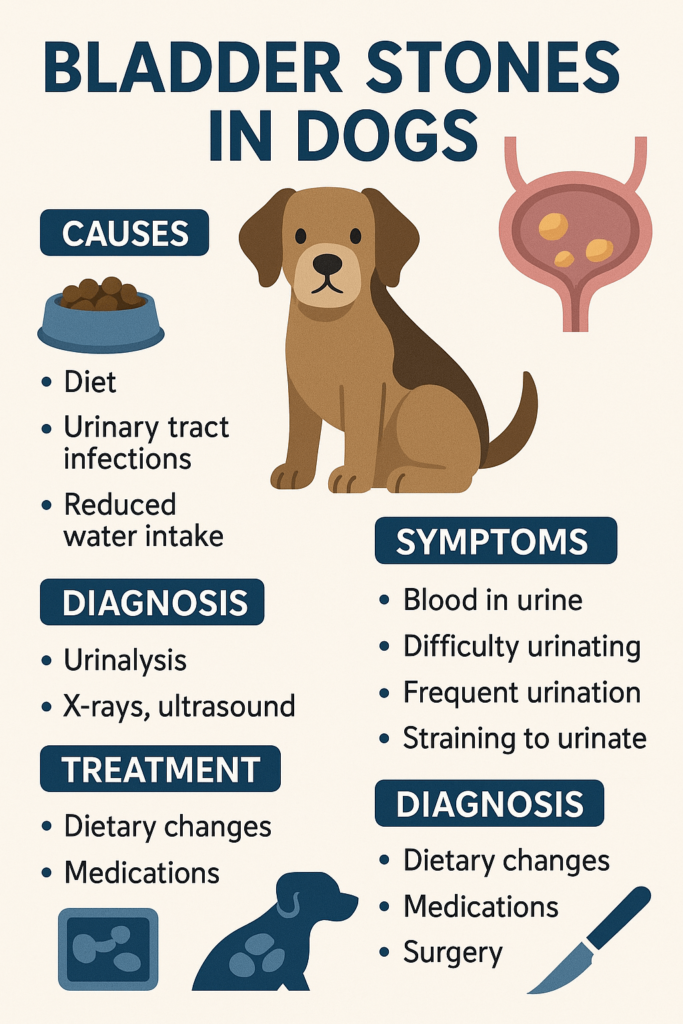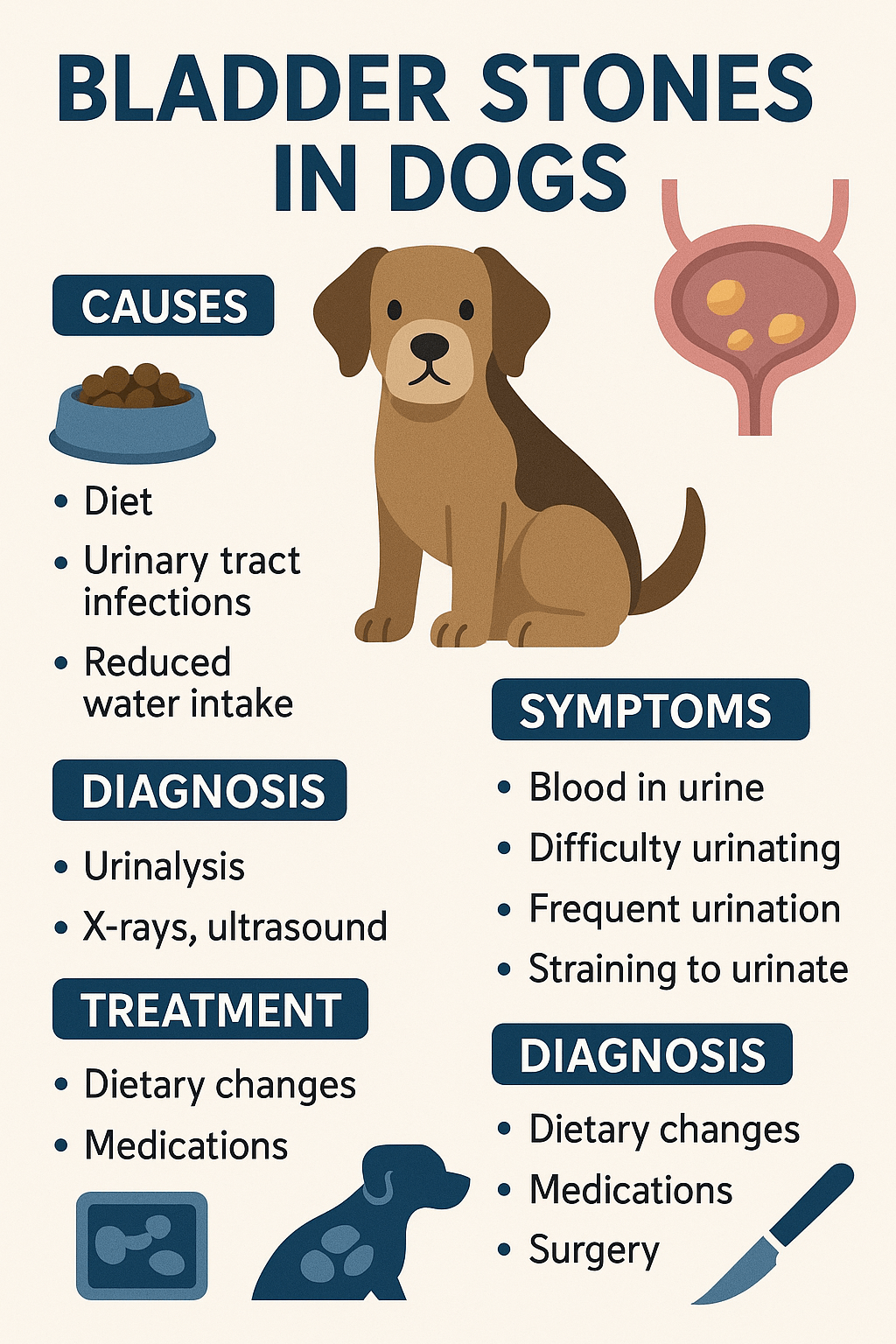Bladder Stones in Dogs: Causes, Symptoms, and Treatment
Bladder stones, also known as uroliths, are a common yet concerning health issue that can affect dogs of all breeds and ages. These mineral formations develop in the urinary tract and can lead to discomfort, infection, and even life-threatening complications if left untreated. Understanding the causes, recognizing the symptoms, and knowing the available treatment options are essential for ensuring your dog’s well-being. In this blog post, we’ll explore everything you need to know about bladder stones in dogs, from prevention strategies to expert advice on managing this condition effectively.
Expert Insight on Bladder Stones in Dogs
“Bladder stones in dogs are solid mineral formations that can vary in size and number. Dogs with bladder stones have changes in urination, may have blood in their urine, and experience pain and discomfort.”
Common Causes of Bladder Stones in Dogs
Bladder stones form when minerals in a dog’s urine crystallize and accumulate over time. Several factors contribute to their development, and understanding these causes can help prevent recurrence.
Dietary Imbalances:
Certain diets high in minerals like calcium, phosphorus, or magnesium can increase the risk of stone formation.Dehydration:
Insufficient water intake leads to concentrated urine, creating an environment where stones are more likely to form.Urinary Tract Infections (UTIs):
Bacterial infections can alter the pH of urine, promoting the growth of specific types of stones.Genetic Predisposition:
Some breeds, such as Dalmatians and Shih Tzus, are more prone to developing bladder stones due to genetic factors.Metabolic Disorders:
Conditions like hypercalcemia or liver shunts can disrupt normal urinary function, increasing the likelihood of stone formation.
By addressing these underlying causes, pet owners can take proactive steps to reduce the risk of bladder stones in their dogs.

Signs Your Dog May Have Bladder Stones
Recognizing the symptoms of bladder stones early is crucial for timely intervention. Keep an eye out for these common signs that may indicate your dog is suffering from this condition.
Frequent Urination Attempts:
Dogs with bladder stones often strain to urinate or make frequent trips outside without producing much urine.Blood in Urine:
The presence of blood in your dog’s urine is a red flag that should not be ignored.Painful Urination:
Whining or showing signs of discomfort while urinating suggests irritation or blockage caused by stones.Licking Genital Area Excessively:
Dogs may lick their genital area frequently in an attempt to relieve discomfort.Loss of Appetite or Lethargy:
If bladder stones cause severe pain or infection, your dog may become lethargic or refuse to eat.
If you notice any of these symptoms, consult your veterinarian promptly to ensure proper diagnosis and treatment.
Check this guide 👉Male Dog Bladder Infection Symptoms: Best 7 Expert Tips!
Check this guide 👉Bladder Cancer in Dogs: Best 7 Expert Tips!
Check this guide 👉Understanding Thickened Bladder Wall in Dogs: Best 7 Tips!
Types of Bladder Stones in Dogs | Prevention Tips |
|---|---|
Struvite Stones | Feed a balanced diet low in magnesium |
Calcium Oxalate Stones | Encourage increased water consumption |
Urate Stones | Avoid high-protein diets for susceptible breeds |
Cystine Stones | Monitor urinary pH regularly |
Silica Stones | Limit exposure to silica-rich foods |
Treatment Options for Bladder Stones in Dogs
The treatment for bladder stones depends on the type, size, and severity of the condition. Here are some common approaches veterinarians may recommend.
Medication:
Certain medications can dissolve struvite stones or manage underlying infections contributing to stone formation.Dietary Changes:
Prescription diets formulated to adjust urinary pH and reduce mineral levels can help dissolve existing stones or prevent new ones.Urohydropropulsion:
This non-surgical procedure uses a catheter to flush small stones out of the bladder.Surgical Removal:
Large or stubborn stones may require surgery to remove them safely and effectively.Laser Lithotripsy:
Advanced techniques like laser lithotripsy break down stones into smaller pieces that can pass naturally.
Each treatment option has its benefits and risks, so work closely with your vet to determine the best course of action for your dog.
Preventing Bladder Stones in Dogs
Prevention is key to avoiding the recurrence of bladder stones and maintaining your dog’s urinary health. Follow these tips to minimize the risk.
Provide Ample Fresh Water:
Ensure your dog always has access to clean, fresh water to encourage hydration and dilute urine.Feed a Balanced Diet:
Choose high-quality dog food that meets your pet’s nutritional needs and avoids excessive minerals.Monitor Urine pH Levels:
Regular testing can help identify imbalances that may predispose your dog to stone formation.Encourage Regular Exercise:
Physical activity promotes overall health and helps maintain a healthy urinary system.Schedule Routine Vet Check-Ups:
Early detection of urinary issues through regular exams can prevent complications down the line.
By implementing these preventive measures, you can significantly reduce the likelihood of bladder stones affecting your furry friend.
Complications Caused by Bladder Stones
If left untreated, bladder stones can lead to serious complications that impact your dog’s quality of life. Understanding these potential risks underscores the importance of prompt treatment.
Urinary Blockages:
Stones can obstruct the urethra, preventing your dog from urinating—a medical emergency requiring immediate attention.Chronic Infections:
Bladder stones create a breeding ground for bacteria, leading to recurrent urinary tract infections.Kidney Damage:
Prolonged obstruction or infection can damage the kidneys, resulting in long-term health issues.Behavioral Changes:
Pain and discomfort from bladder stones may cause irritability, aggression, or withdrawal in affected dogs.Weight Loss and Malnutrition:
Dogs with severe cases may lose their appetite, leading to weight loss and nutritional deficiencies.
Addressing bladder stones early prevents these complications and ensures your dog remains happy and healthy.
Breeds Prone to Bladder Stones
Certain dog breeds are genetically predisposed to developing bladder stones due to their unique physiology. Knowing if your dog is at higher risk can help you take preventive action.
Dalmatians:
This breed is prone to forming urate stones due to difficulties processing uric acid.Shih Tzus:
Small breeds like Shih Tzus often struggle with calcium oxalate stones.Bichon Frises:
These dogs are susceptible to struvite stones, often linked to urinary tract infections.Miniature Schnauzers:
Known for developing calcium oxalate stones, they require careful dietary management.English Bulldogs:
Their tendency toward urinary issues makes them vulnerable to various types of stones.
Understanding breed-specific risks allows owners to tailor prevention strategies accordingly.
Home Remedies and Supplements for Support
While professional veterinary care is essential, certain home remedies and supplements can complement treatment plans for dogs with bladder stones.
Increased Water Intake:
Adding water to dry kibble or using pet water fountains encourages dogs to drink more.Herbal Supplements:
Ingredients like cranberry extract and marshmallow root may support urinary health, though always consult your vet first.Probiotics:
Probiotic supplements promote gut health and may reduce the risk of urinary tract infections.Moist Foods:
Feeding wet or canned food increases moisture content in your dog’s diet, reducing urine concentration.Regular Walks:
Frequent bathroom breaks help flush out the urinary system and prevent stagnation of urine.
These supportive measures, combined with veterinary guidance, can enhance your dog’s recovery and overall well-being.
Frequently Asked Questions About Bladder Stones in Dogs
What are bladder stones made of?
Bladder stones consist of mineral deposits like struvite, calcium oxalate, or urates, depending on the dog’s diet and urinary chemistry.
Can bladder stones be fatal?
Yes, if they cause a complete urinary blockage, it can become life-threatening within hours. Immediate veterinary care is critical.
How are bladder stones diagnosed?
Veterinarians use imaging techniques like X-rays or ultrasounds, along with urine analysis, to identify stones.
Can diet alone dissolve bladder stones?
For certain types like struvite stones, a prescription diet may dissolve them, but other types require surgical removal.
Are bladder stones painful for dogs?
Yes, they can cause significant discomfort, especially during urination or movement.
Prioritizing Your Dog’s Urinary Health
Bladder stones in dogs are a challenging but manageable condition with proper knowledge and care. By understanding the causes, recognizing symptoms early, and following your veterinarian’s guidance, you can protect your dog from unnecessary pain and complications. Prevention plays a vital role, so focus on providing a balanced diet, ample hydration, and routine check-ups to keep your furry companion healthy. Remember, your dog relies on you to advocate for their well-being—so stay informed, proactive, and attentive to ensure a happy, stone-free life together.
Cat Anaphylactic Shock Treatment Costs: Best 7 Expert Tips! – Learn about costs, treatments, and financial aid options to save your cat’s life.
Exocrine Pancreatic Insufficiency in Cats: Best 7 Tips! – Learn to spot symptoms, manage EPI effectively, and improve your cat’s quality of life with expert advice.
Cost of Dog Anaphylactic Shock Treatment: Best 7 Tips! – Learn about emergency costs, financial planning, and ways to manage expenses for your dog’s care.
Exocrine Pancreatic Insufficiency in Dogs: Best 7 Tips! – Learn to spot symptoms, manage EPI effectively, and improve your dog’s quality of life with expert guidance.





